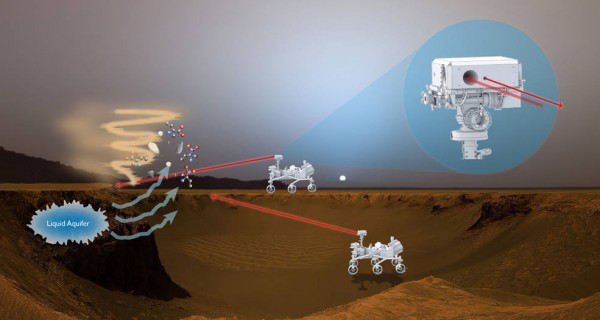By Ana Verayo, | November 04, 2016

This artist’s rendition shows how a proposed laser-fluorescence instrument could operate on Mars. (NASA)
NASA engineers are working with the United States military to develop a new scientific instrument that can "sniff" out biosignatures on Mars.
Scientists from NASA's Goddard Space Flight Center are developing the prototype known as the BILI (Bio-Indicator Lidar Instrument) which is inspired by a current sensor used by the military to detect hazardous toxins and pathogens lurking in the air.
Like Us on Facebook
The BILI instrument is powered by a remote sensing technique known as LIDAR (Light Detection and Ranging) method that utilizes fluorescence. LIDAR is similar to radar that uses radio waves. However, the BILI uses light to detect and determine any potential dangerous airborne particles.
Apart from this, NASA has utilized fluorescence-based LIDAR instruments to examine and analyze the Earth's atmosphere, but not yet in deep space.
According to Branimir Blagojevic of NASA's Goddard Space Flight Center, NASA has never used BILI on planetary exploration on the surface level before.
Mars mission scientists can utilize this new instrument by mounting it on a Martian rover similar to Curiosity. It will scan for dust and other plumes and emissions in the alien world. BILI will signal with light pulses when it detects something, which can cause the particles to become fluorescent.
BILI will then analyze these reactive particles for any signs of organic signatures that can potentially indicate microbial life.
NASA scientists describe this breakthrough innovation similar to a nose that can sniff out biosignatures in real-time as the rover explores the alien terrain. NASA scientists may now be able to efficiently identify which regions on the Red Planet are more ideal for potential life.
Blagojevic added that this instrument would be integrated into future Martian missions to detect more organic biosignatures and overall, to increase the chances of finding clues about past and present life on Mars.
-
Use of Coronavirus Pandemic Drones Raises Privacy Concerns: Drones Spread Fear, Local Officials Say

-
Coronavirus Hampers The Delivery Of Lockheed Martin F-35 Stealth Fighters For 2020

-
Instagram Speeds Up Plans to Add Account Memorialization Feature Due to COVID-19 Deaths

-
NASA: Perseverance Plans to Bring 'Mars Rock' to Earth in 2031

-
600 Dead And 3,000 In The Hospital as Iranians Believed Drinking High-Concentrations of Alcohol Can Cure The Coronavirus

-
600 Dead And 3,000 In The Hospital as Iranians Believed Drinking High-Concentrations of Alcohol Can Cure The Coronavirus

-
COVID-19: Doctors, Nurses Use Virtual Reality to Learn New Skills in Treating Coronavirus Patients







